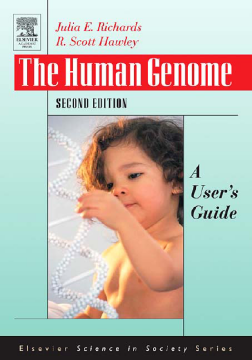
Additional Information
Book Details
Abstract
This second edition of a very successful text reflects the tremendous pace of human genetics research and the demands that it places on society to understand and absorb its basic implications. The human genome has now been officially mapped and the cloning of animals is becoming a commonplace scientific discussion on the evening news. Join authors Julia Richards and Scott Hawley as they examine the biological foundations of humanity, looking at the science behind the sensation and the current and potential impact of the study of the genome on our society.
The Human Genome, Second Edition is ideal for students and non-professionals, but will also serve as a fitting guide for the novice geneticist by providing a scientific, humanistic, and ethical frame of reference for a more detailed study of genetics.
New in this edition:
· 60% new material, including data from the Human Genome Project and the latest genetics and ethics discussions
· Several new case studies and personal stories that bring the concepts of genetics and heredity to life
· Simplified treatment of material for non-biology majors
· New full-color art throughout the text
· New co-author, Julia Richards, joins R. Scott Hawley in this revision
"The clarity of writing...in The Human Genome, A User's Guide makes an understanding of genetics accessible to everyone."
-Bruce Chase, University of Nebraska at Omaha
"...Well thought-out and full of good examples that clearly explain some of the more difficult concepts in modern genetics."
-Richard K. Wilson, Washington University
"The authors have done a superb job of identifying key concepts and breaking them down into understandable and relevant explanations..."
-Neil Lamb, Emory University
"...An excellent version of classical human genetics for sophomore level science students or for all levels of non-science majors."
- John Merriam, University of California at Los Angeles
"It is enjoyable to read, clear, and accurate... The first edition was excellent but this one is even better." -Philip Meneely, Haverford College
